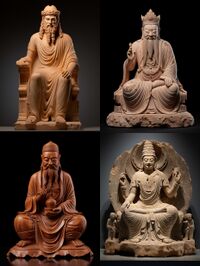Phosattism
| Part of a series on |
| Phosattism |
|---|
 |
Phosattism is a non-theistic religion, primarily concentrated in Alharu with other concentrations being found in the Aurelian Shield, Thalassa and Europa. Founded in the year 400 BCE, it is based on the teachings of the revered philosopher and moralist, Phosattus (Lanang Pe̍h-ōe-jī: Phô, Huang: Fū). Phosattism is known for its focus on inner light, wisdom, and a deep connection with nature. Phosattism has spread into many parts of Aurelia and Alharu, including across the Oriental Ocean to Thalassa and Europa, holding significant influence over the philosophies, art, and politics of various cultures.
Etymology
The term "Phosattism" is derived from the name of its founder, Phô, the name Phosattus being the Laimiaic rendition of his original name. The name Phô originates from Phosattus' native Lanang language meaning "trust".
The native name of Phosattism in the Lanang language is Phô-kàu (孚教) meaning "The teachings of Phô/Phosattus".
Wurldview
Phosattism presents a non-dualistic wurldview, where all life forms on Eurth are interconnected through their Inner Light. This fundamental essence is not perceived as a divine force but rather as the embodiment of natural wisdom and moral potential. It posits that the universe is inherently neutral, but through Reflectivity – the effects of one's actions on the wurld - individuals can influence their surroundings positively or negatively. In essence, Phosattism offers an optimistic wurldview where each individual has the capacity to contribute to a more harmonious and enlightened wurld.
Beliefs

Phosattists believe that every living being possesses an Inner Light, representing inherent wisdom and the capability for moral judgement. This Inner Light is not divine but a natural part of existence, seen as the fundamental essence that unites all life on Eurth. It is believed that the purpose of life is to realise and enhance this light, a process known as Illumination.
The concept of Reflectivity is also central to Phosattism, which states that an individual's actions reflect their inner light and influence the wurld around them. Phosattists strive for Clear Reflectivity, characterised by positive actions that bring about peace, harmony, and progress, while reducing suffering.
Ethics
Phosattist ethics are guided by the Principles of Radiance, a set of moral guidelines that Phosattus is believed to have preached. These principles include: Compassion (empathy for all living beings), Truth (honesty and integrity), Balance (moderation and avoidance of extremes), and Growth (continuous learning and self-improvement).
Practices
Phosattism places high importance on meditation, known as Luminance. This involves introspective practices aimed at understanding oneself, increasing awareness of the Inner Light, and achieving greater Reflectivity. Many Phosattists gather in public spaces called 'Solarae' to engage in communal Luminance.
Pathwalking, another key practice, involves physically journeying through natural environments, metaphorically symbolising the individual's journey to Illumination. It encourages harmony with nature and is often undertaken during significant phases of life, such as adulthood or during times of personal struggle.
Phosattist texts
Scripts of Illumination

The Scripts of Illumination are the foundational texts of Phosattism, widely believed to be authored by Phosattus himself. The scripts are written in an elegant, metaphorical style, weaving together philosophy, ethical teachings, and personal reflections. It is through these scripts that Phosattus introduced the concept of the Inner Light and its manifestation as Reflectivity in the wurld.
The Scripts of Illumination are divided into three parts:
- The Awakening: This section narrates Phosattus's profound epiphany, his discovery of the Inner Light. It delves into the nature of existence and consciousness, stimulating introspection and intellectual exploration.
- The Path of Light: This part offers practical guidance on nurturing one's Inner Light through practices like Luminance and Pathwalking. It contains detailed meditation techniques and philosophical discourses on harmony with nature.
- Radiant Reflections: This final part discusses Reflectivity and the impact of one's actions on the world. It provides ethical guidance, encouraging readers to reflect their Inner Light onto the world through positive action.
Principles of Radiance
The Principles of Radiance is a concise but potent book that distills the essential ethical teachings of Phosattism. It is derived from the ethical discourse present in the Scripts of Illumination but is presented in a more accessible, straightforward manner.
The Principles of Radiance is structured around the four fundamental virtues of Phosattism:
- Compassion: The book encourages empathy for all life forms, arguing that recognizing the shared Inner Light amongst all beings fosters understanding and kindness.
- Truth: Honesty and integrity are highlighted, asserting that truthful actions and communication are the clearest reflections of the Inner Light.
- Balance: This principle promotes moderation and avoidance of extremes. It stresses that balance – in emotions, actions, and lifestyle – nurtures the Inner Light.
- Growth: Lastly, the text encourages continuous learning and self-improvement, arguing that the quest for knowledge brightens the Inner Light.
The Principles of Radiance serves as a practical guide for ethical living in line with Phosattus's teachings. Both the Scripts of Illumination and Principles of Radiance are essential readings within all schools of Phosattism.
History
Phosattus, born in the city-state of Luminara, was a renowned philosopher. Known for his intellect and wisdom, he frequently questioned the state of moral values in society. His critical thinking led him to an epiphany, an awakening of his Inner Light. His teachings were first recorded in the Scripts of Illumination, now the central religious text of Phosattism.
The religion spread quickly through Thalassa, with its non-dogmatic approach and emphasis on personal growth resonating with many. As Thalassan trade and influence expanded, so did Phosattism, reaching other continents and cultures on Eurth. Today, it remains a major religious and philosophical force across the planet.
Phosattus
Phosattus (431-361 BCE) was a revered philosopher and moralist, known for founding Phosattism in the city-state of Luminara on the Thalassan continent. His teachings on the 'Inner Light' and 'Reflectivity' have profoundly influenced Eurth, positioning Phosattism as a significant religious and philosophical force.
Born in a modest family, Phosattus demonstrated a keen intellect and curiosity from an early age. He pursued a broad range of studies, showing particular interest in ethics, philosophy, and the natural wurld. Phosattus became known for his questioning of societal norms, pushing for moral and intellectual advancement within Luminara.
In 403 BCE, Phosattus underwent what is now referred to as his 'Awakening.' He described experiencing a profound insight into the nature of existence, leading to the concept of the Inner Light. Following this, he dedicated his life to refining and spreading his philosophy.
Phosattus wrote extensively, with his most notable work being the Scripts of Illumination. These texts form the foundation of Phosattism and outline the Principles of Radiance. He taught that every individual possessed the capacity to cultivate their Inner Light, promoting wisdom, compassion, and truth.
Phosattus passed away in 361 BCE, but his influence continued to grow posthumously, spreading beyond Luminara and throughout Thalassa and the rest of Eurth.
Luminara
Luminara is a prominent island nation located in the Aurelian Shield on Eurth.[a] Known for its natural beauty and tranquil environment, it is widely regarded as a beacon of intellectualism and cultural advancement.
Founded in the 6th centure BCE, Luminara swiftly became a centre of commerce and learning, attracting scholars and traders alike. Architecturally, the city is renowned for its unique harmony of nature and built environment. The cityscape is interspersed with lush green spaces, designed to promote tranquillity and encourage contemplation.
The social structure of Luminara is known for its emphasis on equality and communal decision-making, influenced by the teachings of Phosattus. As the birthplace of Phosattism, the city-state is home to numerous Solarae, meditation spaces where residents regularly gather for Luminance.
Luminara's culture heavily values education and intellectual pursuits. The city is home to the prestigious University of Luminara, which attracts students from across Eurth. Notably, the teachings of Phosattus and the study of Phosattism are integral parts of the curriculum.
Luminara's influence, both economically and culturally, has been significant in the spread of Phosattism, making the city a spiritual hub for followers wurldwide. Despite its size, Luminara continues to maintain a reputation as a city of peace, wisdom, and profound philosophical insight.
Later Phosattists
The Later Phosattists, also known as the Neo-Phosattists, emerged around 500 years after Phosattus's death, spearheaded by influential figures like Ananda Sen (123-1201) and Priya Darshini (151-222). This movement revisited and reframed Phosattus's original teachings as compiled in the Scripts of Illumination and the Principles of Radiance. Ananda Sen and Priya Darshini, among others, upheld the core Phosattist principles of Inner Light, Reflectivity, and the Principles of Radiance. However, they felt the need to adapt these teachings to address the evolving ethical and philosophical challenges on Eurth.
A cornerstone of the Later Phosattist movement was the heightened emphasis on societal Reflectivity. While Phosattus's original teachings called for a balance of personal growth and societal contributions, Ananda Sen strongly advocated that changing times necessitated a more socially-active role for Phosattists. His teachings significantly influenced Phosattist involvement in community service, social justice, and environmental protection. Priya Darshini, on the other hand, made significant contributions to the concept of Illumination. Diverging from the traditional view of Illumination as a lifelong pursuit, she introduced the idea of 'Partial Illumination.' She posited that individuals could experience transient moments of profound alignment with their Inner Light without having fully achieved Illumination. Furthermore, the Later Phosattists, exemplified by figures like Keshav Patel (1573-1649), emphasised the importance of interfaith dialogue. Patel believed in the enrichment of one's Inner Light through understanding and learning from the diverse religions and philosophies present on Eurth.
The changes brought forth by the Later Phosattists stirred both praise and controversy within Phosattist communities. While some saw their adaptations as a natural evolution of Phosattus's teachings, others viewed them as straying from the original path. Nevertheless, the Later Phosattists, with leaders like Ananda Sen, Priya Darshini, and Keshav Patel, have shaped modern Phosattism. Their influence manifests in the active societal role of Phosattist communities and the evolved understanding of the journey to Illumination.
Schools and traditions
Over the centuries, Phosattism has evolved into various schools and traditions, each interpreting and practising the teachings of Phosattus in unique ways.
- Luminarian School: Originating from Phosattus's hometown of Luminara, the Luminarian School closely follows the original Scripts of Illumination. This tradition emphasises scholarly understanding and personal introspection through Luminance.
- Journeyist School: This school is known for its emphasis on Pathwalking. The Journeyists believe that physical journeys in nature facilitate a deeper understanding of the Inner Light. They are known for their long pilgrimages and semi-nomadic lifestyle.
- Harmonist School: The Harmonists focus on societal Reflectivity and community service. They believe in actively promoting harmony and balance in society, and often engage in various social and environmental initiatives.
Despite these differences, all schools uphold the core Principles of Radiance, underscoring the unity within Phosattism's diversity.
Demographics
Phosattism has followers spread across the entire Eurth, with significant concentrations in Thalassa, its birthplace, and neighbouring continents.
As of the latest Assembled Nations glubal census in 2023, approximately 8% of Eurth's population identified as Phosattist. Notably, Luminara remains a significant hub for Phosattism, housing numerous educational institutions and Solarae.
Phosattist communities are known for their openness and inclusivity, embracing diversity of thought and cultural background. This openness has led to the integration of Phosattist principles into various local traditions and customs, contributing to its widespread adoption and influence across different continents of Eurth.
Phosattism in society
Phosattism's teachings have significantly influenced Eurth's societies, shaping art, politics, and social norms. The religion's emphasis on inner peace and unity with nature has guided architecture and design, leading to the development of tranquil, green cities.
In the realm of art, the practices of Phosattism manifest in unique ways. A notable example is the intricate latte art that baristas create in cafés across Eurth. Patterns such as the heart, tulip, and Rosetta are not just aesthetic choices but symbolic expressions of Phosattist principles. The heart pattern signifies compassion, a key aspect of Radiance; the tulip represents growth, reflecting personal evolution towards the Inner Light; and the Rosetta, with its many petals converging towards a centre, symbolises balance and unity, core tenets of Phosattism.
Political systems inspired by Phosattism often value open dialogue, community decision-making, and balance of power. The concept of Reflectivity promotes social responsibility, leading to strong communal support systems.
While the specifics of Phosattism can vary regionally, the core principles of Inner Light and Reflectivity remain consistent, making it a unifying force across the diverse cultures of Eurth.






